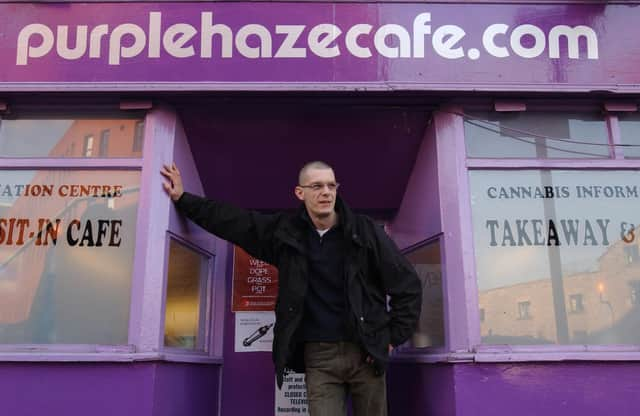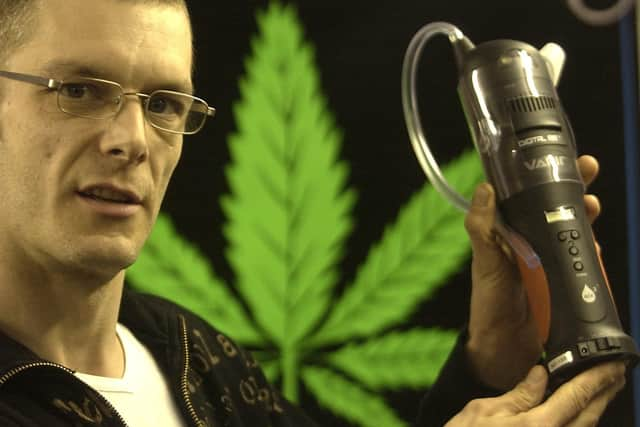How ‘Scotland’s first cannabis cafe’ launched amid a blaze of publicity 20 years ago


Almost 20 years ago, on a cold day in late January 2004, Scotland's first cannabis cafe launched amid a blaze of publicity.
Dozens of customers were joined by uniformed police officers as they waited for Purple Haze in Leith to open its doors at 4pm.
Advertisement
Hide AdAdvertisement
Hide AdEarlier, the cafe on Portland Place had been filled with journalists, photographers and camera crews eager to hear more about the unusual venture.


Owner Paul Stewart, then aged 37, had timed it to coincide with cannabis being downgraded from a Class B drug to Class C. But the police were having none of it.
As punters filed in, officers handed out letters explaining the possession of cannabis was still a criminal offence. Within hours, Mr Stewart had been charged alongside two customers. The story went worldwide.
"I got thousands of emails from all across the world," the 57-year-old remembers now. "I was in every single newspaper in Europe. I was on TV stations, radio shows, newspapers in countries that I'd never even heard of."
He added: "They say everyone gets their 15 minutes of fame. Well, I got that."
The idea was that Purple Haze would operate as a normal cafe during the day before turning into a members-only club after 4pm. Booze was banned, as was tobacco. Cannabis could instead be consumed via bongs or a vaporiser machine.
Almost 100 people passed through its doors in those first few hours. Tommy Sheridan, the leader of the Scottish Socialist Party (SSP), was among them – although only to back a change in the law. “None of us in our party want to promote cannabis or any other drug but we certainly do not believe that someone smoking a joint is a criminal,” he told journalists, before insisting that while alcohol could fuel violence, the only thing he had ever seen a cannabis user attack was a fridge.
“A lot of people just joined and signed up as a statement,” Mr Stewart told The Scotsman. “They didn’'t actually come. Because people had jobs – there was still the stigma. I wasn’t concerned about any stigma to do with cannabis – I'm still not.”
Advertisement
Hide AdAdvertisement
Hide AdHe insisted the venture wasn’t motivated by profit. “I knew I was going to lose money,” he said. “It was a political thing.”
The cafe was a way to “get a conversation going” about drug laws. “If they hadn’t changed the law, I probably wouldn’t have done it,” he added. “It was because they changed the law, I thought I was going to push that law a little bit further and see what the police say.”
Kevin Williamson, the founder of Rebel Inc, the magazine which first published extracts from Irvine Welsh’s Trainspotting, helped with publicity and press and setting up a membership scheme. At the time, he was the drugs spokesman for the SSP.
“From 2001, I started campaigning to open a cannabis coffee shop in Edinburgh,” Mr Williamson explained. “The inspiration was one in Stockport which opened in 2001, which the police and government turned a blind eye to for a few months to see how it went.
“There was the possibility of change in the air. It wasn’t just about decriminalising cannabis, it was about trying to drive a wedge between the much more dangerous cannabis market and the illegal heroin market at the time.
He said public opinion was “overwhelmingly supportive”, adding: “By the end of 2003 the window of enlightened drug policy was closing and it was a case of then or never. That’s when I heard that Paul Stewart wanted to do something similar and had cafe premises in Leith. He was totally game and up for it so I abandoned my own plans and helped Paul instead, doing publicity and press and sorting out a membership scheme. On the opening day, Paul worked the cafe and I worked the door.
“The opening day was a total buzz. The police did a token bust on the night but the idea we were trying to publicise caught on. Both parliaments had to respond to the media circus. It was great publicity for the ideas of decriminalisation of cannabis and a progressive drug policy.”
But Purple Haze lasted only a few weeks before Mr Stewart announced he was packing it in. His takings “took a massive hit” because of incorrect media reports that the cafe had been shut down by the authorities, he says now. A stressful personal situation – including a stint in homeless accommodation – added to his problems. Mr Stewart also felt persecuted by the police, who he believes took a heavy-handed approach.
Advertisement
Hide AdAdvertisement
Hide AdTom Wood, the deputy chief constable of Lothian and Borders Police from 1998 until 2005, remembers things differently.
“The whole thing was a gimmick,” he told The Scotsman. “Our view, my view, was that we shouldn’t get drawn into the publicity machine surrounding it. We didn’t want to become a foil in the game. As I recall, what we did was we policed it with a pretty light touch. But we were convinced that it would never fly, and in fact it didn’t.”
He added: “What we didn’t want to do is get ourselves into the position of making a photographic opportunity for you guys [the media] – bursting in there, you know. I was the director of operations. I remember speaking to the division commander and saying: ‘Look, let’s just see how it goes. Let’s not make a spectacle of ourselves.’
“If you do that, then you encourage others to come forward. You start a battle, when there’s no necessity to do it.”
Mr Stewart bought a one-way ticket to France, and, in his own words: “F**ked off in my campervan and left everything behind”. He now works as a tour guide in Edinburgh.
But, as the twentieth anniversary of Purple Haze approaches, he has no regrets. It was a small piece of Scottish history, he told a journalist in March 2004. For a couple of weeks, “it was the most talked about cafe in the world”.
